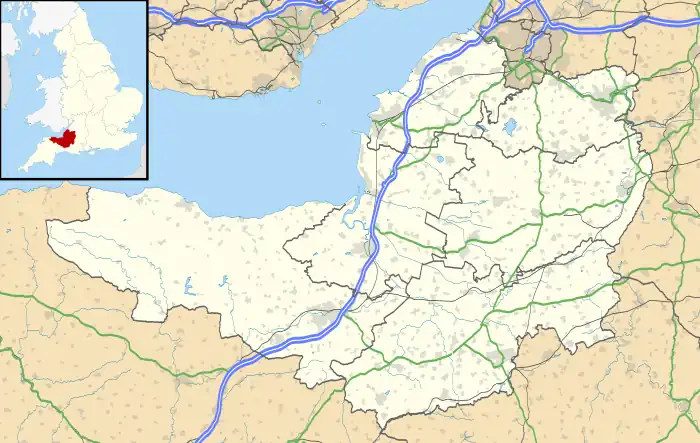 Site visit during excavations, July 2013 | |
 Shown within Somerset | |
| Location | Tonedale, Wellington |
|---|---|
| Region | Somerset |
| Coordinates | 50°59′13″N 3°13′51″W / 50.98694°N 3.23083°W |
| Area | 0.4 hectares (0.99 acres) |
| History | |
| Founded | 12th century |
| Abandoned | 14th century |
| Periods | Bronze Age |
| Site notes | |
| Excavation dates | 2013 |
| Archaeologists | Wessex Archaeology |
| Ownership | Bloor Homes |
Longforth Farm, on the outskirts of Wellington, Somerset, England, is the site of a Bronze Age landscape and an extensive medieval structure.[1]
The previously unknown site, which covers 0.4 hectares (0.99 acres),[2] was uncovered during excavations in 2013 prior to the building of 500 new houses by Bloor Homes.[3]
The stone foundations, which are covered in decorated tiles are laid out around courtyards. The remains of roof slates and glazed ceramic roof tiles have also been found.[4] The floor tiles are similar to those at Glastonbury Abbey, while the pottery finds have been dated to between the 12th and 14th centuries.[2]
References
- ↑ "Longforth Farm". Wessex Archaeology. Retrieved 8 July 2013.
- 1 2 Kennedy, Maev (8 July 2013). "Medieval ruins discovered in Somerset puzzle architects". Guardian. Retrieved 8 July 2013.
- ↑ "Coming Soon...A superb collection of 2, 3 & 4 bedroom homes". Bloor Homes. Archived from the original on 27 June 2013. Retrieved 8 July 2013.
- ↑ Nichols, Karen. "Mystery Medieval Archaeological Site Uncovered at Somerset Housing Development". Wessex Archaeology. Retrieved 8 July 2013.
External links
This article is issued from Wikipedia. The text is licensed under Creative Commons - Attribution - Sharealike. Additional terms may apply for the media files.